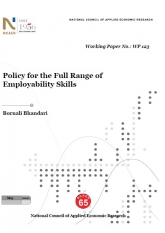Policy for the Full Range of Employability Skills
Bornali Bhandari
May 2021
The objective in this paper is to define the full range of employability skills from Pre-Kindergarten to Higher Education and integrate it to the ground-level realities in the Indian context. It clearly identified that there are four types of skills –cognitive, socio-emotional, physical or psychomotor and job-specific skills. Every job role requires a different permutation and combination of these skills. These skills are mapped across foundational and advanced skills. The third objective is to propose an integrated perspective on education and training for India, which provided the maximum flexibility to workers to determine their own path. Education up to Class X has to be made compulsory. There should be two pathways after that – general schools that offer general education with vocational education and vocational schools that offer vocational education with general education. Apprenticeships needed to be made compulsory in the latter. Internships could be offered in both types of schools. The quality had to be strengthened to deliver a full range of skills at all levels. Even after landing a job, options for re-skilling and upskilling had to be offered. However, a demand-supply side delineation of the full range of the skill set shows that the supply-side is only delivering part of the skill set and even that suffers from quality issues. For example, nowhere active listening and active learning are recognised as key foundational cognitive skills, neither in policy nor in literature. However, these are two skills that employers want. The matching, if at all, was either at the very low-end at the primary/middle school level or at the college level.
Trade, Technology and Skills







